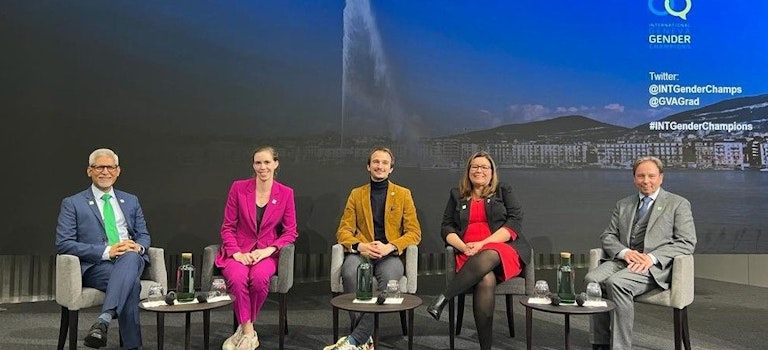On 8 March 2023, the International Gender Champions (IGC) and Geneva Graduate Institute celebrated International Women’s Day by co-hosting the 2023 Geneva Gender Debate. This event promotes dialogue on an important gender-related topic through the art of debate. This year, the motion debated was, “this house believes that countries which prioritise gender equality should adopt a feminist foreign policy”.
In her opening remarks, Margot Wallström, the former Minister for Foreign Affairs of Sweden, described how stories of sexual violence experienced by women and girls globally inspired her to pioneer the first feminist foreign policy. She shared how this policy allowed for greater accountability and action towards women enjoying the same rights and opportunities as men.
The lively debate that followed was moderated by Darius Farman, Co-Director of foraus.
Arguing in favour of the motion were:
• Marc Bichler, Ambassador and Permanent Representative of Luxembourg to the UN and other International Organizations in Geneva
• Claudia Fuentes Julio, Ambassador and Permanent Representative of Chile to the UN and other International Organizations in Geneva.
Assigned to argue against the motion were:
• Jagan Chapagain, Secretary-General of the International Federation of Red Cross and Red Crescent Societies
• Cäcilia Riederer, student at the Graduate Institute and member of the Institute’s Feminist Collective.
Ambassador Bichler opened the debate by arguing that feminist foreign policy fights systemic inequalities and ensures the participation and representation of women at all levels of decision making. He stated that, “far from being neutral, a foreign policy which is not feminist therefore cements…the status quo.”
Jagan Chapagain emphasized his belief that, while feminist foreign policy is well intended, it is not the best vehicle for achieving gender equality. He argued that feminist foreign policy goes against the global trends of localization and decolonization. Rather than feminist foreign policies developed in capitals and policies that could create power imbalances between the Global North and South, Mr Chapagain supported local communities driving the agenda for gender equality.
Cäcilia Riederer continued, stating that foreign policy is developed within a “somewhat exclusive, privileged circle and does not go far enough in dismantling patriarchal and racial and neocolonial hierarchies across the globe.” She argued that before advocating for the adoption of feminist foreign policies, states should prioritize intersectional feminist approaches and local lived realities.
Ambassador Fuentes Julio offered a counter point, describing how Latin American grassroots feminist movements led to the adoption of feminist foreign policies in her region. She argued that feminist foreign policy action included continued work with local civil society and women’s movements, using a bottom-up approach. Furthermore, she explained that from her perspective, feminist foreign policy goes beyond women to address LGBTQI+, Indigenous, and other traditionally excluded communities.
Debaters provided a thought-provoking and nuanced discussion about the best way to promote gender equality globally. As Martin Chungong, Secretary General of the Inter-Parliamentary Union and Chair of the IGC Global Board, concluded, “We might have differing opinions when it comes to choosing the best vehicle for propelling us forward – but let’s not forget that we do share the same mission.”
You can access the 2023 Geneva Gender Debate recording here.
Or listen in on our March podcast, sharing highlights of the debate here.
